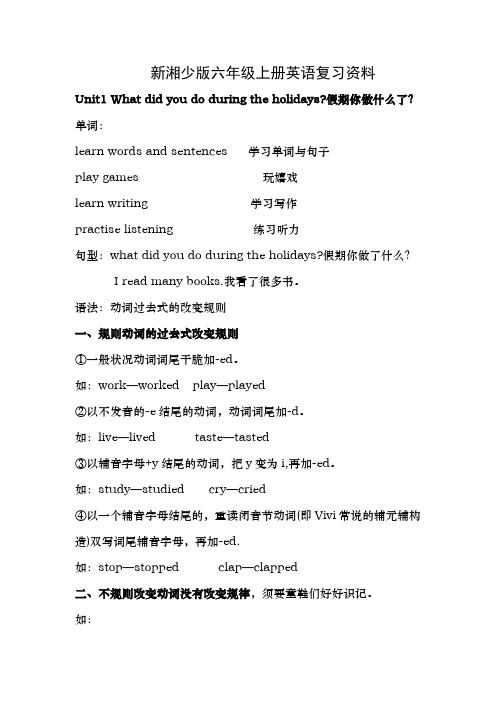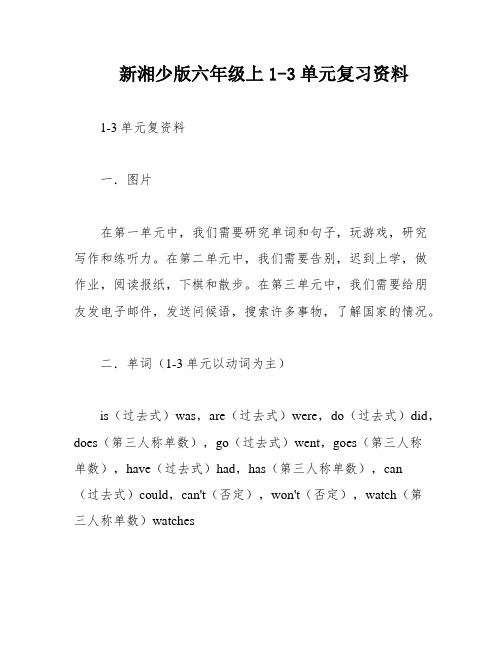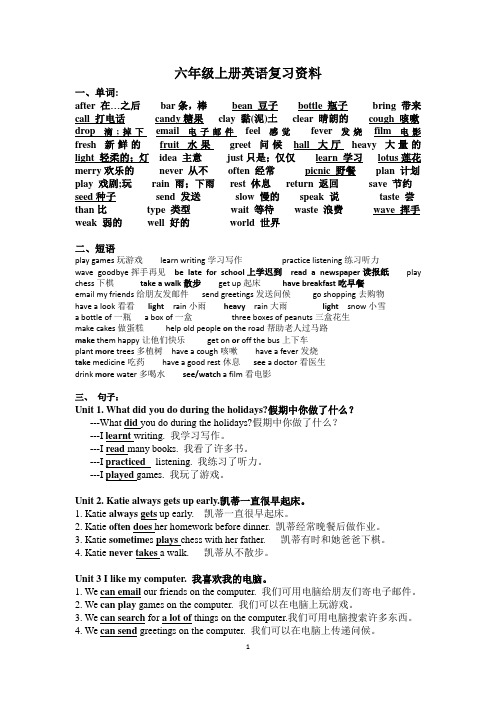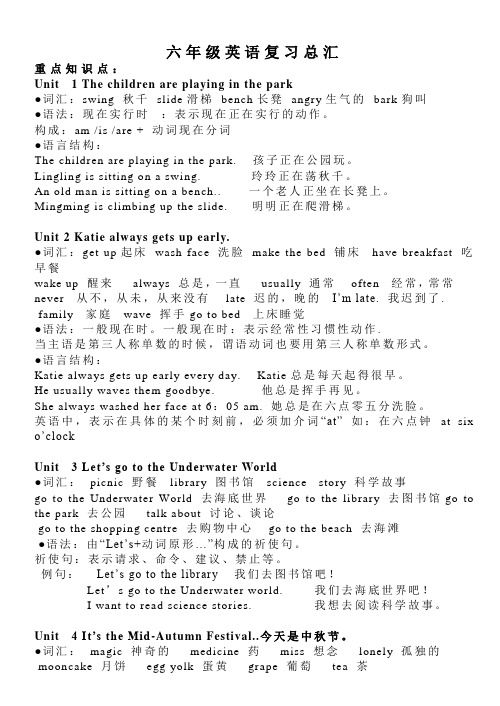新湘少版六年级(上册)英语复习资料全
新湘少版六年级上册英语复习资料全

新湘少版六年级上册英语复习资料Unit1 What did you do during the holidays?假期你做什么了?单词:learn words and sentences 学习单词与句子play games 玩嬉戏learn writing 学习写作practise listening 练习听力句型:what did you do during the holidays?假期你做了什么?I read many books.我看了很多书。
语法:动词过去式的改变规则一、规则动词的过去式改变规则①一般状况动词词尾干脆加-ed。
如:work—worked play—played②以不发音的-e结尾的动词,动词词尾加-d。
如:live—lived taste—tasted③以辅音字母+y结尾的动词,把y变为i,再加-ed。
如:study—studied cry—cried④以一个辅音字母结尾的,重读闭音节动词(即Vivi常说的辅元辅构造)双写词尾辅音字母,再加-ed.如:stop—stopped clap—clapped二、不规则改变动词没有改变规律,须要童鞋们好好识记。
如:go—went make—made get—got buy—bought learn—learnt do—didtake—took have—had read—read speak—spoke teach—taught say—saidUnit2 Katie always gets up early凯蒂总是很早起床词汇:(频度副词:always总是、often经常、sometimes有时、never 从不)get up 起床return home 回家take a walk 去漫步do her homework 做她的家庭作业have breakfast/lunch/dinner吃早/ 中/ 晚餐play chess 下象棋wave goodbye 挥手再见read a newspaper 读报纸be late for school 上学迟到句型:Peter always gets up at 7:00 a.m。
新湘少版六年级上1-3单元复习资料

新湘少版六年级上1-3单元复习资料1-3单元复资料一.图片在第一单元中,我们需要研究单词和句子,玩游戏,研究写作和练听力。
在第二单元中,我们需要告别,迟到上学,做作业,阅读报纸,下棋和散步。
在第三单元中,我们需要给朋友发电子邮件,发送问候语,搜索许多事物,了解国家的情况。
二.单词(1-3单元以动词为主)is(过去式)was,are(过去式)were,do(过去式)did,does(第三人称单数),go(过去式)went,goes(第三人称单数),have(过去式)had,has(第三人称单数),can(过去式)could,can't(否定),won't(否定),watch(第三人称单数)watches另外,read的过去式是read,learn的过去式是learned或learnt,write的过去式是wrote,talk的过去式是talked,speak的过去式是spoke,say的过去式是said,see的过去式是saw,run的过去式是ran,sit的过去式是sat,give的过去式是gave,sing的过去式是sang,ring的过去式是rang,take的过去式是took,stand的过去式是stood,teach的过去式是taught,buy的过去式是bought。
Play。
practice。
climbed。
asked。
wanted。
showed.During the holidays。
XXX。
I personally learned writing。
read many books。
XXX.XXX。
I am XXX.Kate always wakes up early。
her family often has breakfastat 6:45 a.m。
and Peter frequently watches TV at 7:00 p.m.We can email our friends and search for a lot of things。
新湘少版六年级英语上下册资料

六年级上册英语复习资料
一、单词:
after 在……之后awa总是;经常bar条,棒bean 豆子
boue 女式短上衣botte瓶子bring 带来ca 打电话
cand糖果Chritma 圣诞节centre中心ca 黏土;泥土
cear 晴朗的coourfu 彩色的concert 音乐会cough 咳嗽decorate装饰dre uing 中秋节要到了。
1 I’d ie a bo of otu eed mooncae and a bo of red bean mooncae
我想要一盒莲子月饼和一盒红豆月饼。
2 I eno eating mooncae 我喜欢吃月饼。
3 I eno ooing at the moon 我喜欢赏月。
Unit 5 It wi be unn and coo tomorrow 明天将是晴朗和凉爽。
1 It wi be unn and warm tomorrow明天将是阳光明媚。
2 There wi be a ight rain net Monda下周一将降小雨。
3 There wi be a trong wind tomorrow明天将有强风。
4 There wi be a ight now net Monda 下周一将有小雪。
Unit 6 I wi bring a big botte of orange uice 我将带来一大瓶橙汁。
1 I wi bring a few can of Coe 我将带几罐可乐。
2 I wi bring a few bar of chocoate我将带来几块巧克力。
湘少版六年级上册英语复习资料

湘少版六年级上册英语复习资料Unit 1 What did you do during the holidays?During the holidays。
we had a lot of activities。
We learned words and sentences。
played games。
and practiced listening。
Some of us even learned writing and read many books。
We also took the time to speak and talk with our friends and family。
It was a fun and productive time.Unit 2 Katie always gets up early.Katie is a very punctual person。
She always gets up early and has breakfast before going to school。
She never wants to be late for school。
so she makes sure to do her homework and read a XXX。
XXX weekdays。
she often goes to bed early to prepare for the next day。
When she leaves for school。
she always waves goodbye to her family.Unit 2 My day一、写出下列单词或短语的汉语意思。
起床,做作业,下棋,散步,泡茶1.get up2.do homework3.play chess4.take a walk5.make XXX1.I always wake up early in the morning.2.Before dinner。
湘少版六年级上册英语复习重点

小学英语六年级(上)复习资料Unit 1 What did you do during the holidays?你在假期都做些什么?● :holiday假期during在 ...期speaklearn words and sentences学和句子play games玩游learn writing学写作practise listening听力● 法 : 一般去:表示去某个里生的作或状去判断志:句子中有表示去的。
yesterday昨天yesterday morning昨天清晨the day before yesterda前天last night昨晚last week上周last month上个月last year昨年just now才two days ago两天前in 1990等⋯ ..组成:主 +去式去式的化:1.直接加 ed: work —worked look — looked2.以不音 e 尾的,直接加 d:live---lived hope---hoped use---used3.以音字母 +y 尾的, yi 加 ed :study— studied carry— carried worry— worried4. 以重音尾且末端只有一个音字母的,双写最后的音字母+ed: stop— stopped plan—planned;5. 以 ic重音体形式尾的,要把ic成- 元 - 构,比如ick再加ed,如nod,n 音,picnic →picnickedo元音,,trafficd 音。
→trafficked6.不化的去式:have---had am/is---w as are---were get---got say---said feel---felt do/does---did go---went drink---drank eat--ate bring----broughtthink----thought buy----bought catch----caught teach----taughtwear----wore cut----cut sweep----swept sleep— slept see----sawbecome----became read----read sit----sat● 言构 :What did you do during the holidays?I read many books.I wrote a little storybook.◆乘坐某种交通工具“ by+ 交通工具的名称”如 : 乘火 by train乘公共汽 by bus可是,有一个特别,步行on footUnit 2 Katie always gets up early.蒂是很早起床。
湘少版六年级上册英语复习核心知识

湘少版六年级上册英语复习核心知识本文档旨在为六年级上册英语研究提供核心知识的复指南。
以下是需要重点复的内容:Unit 1: Greetings- 问候语:Hello, Hi, Good morning, Good afternoon, Good evening, How are you?- 回应问候:I'm fine, thank you. And you?- 自我介绍:My name is... I'm from...- 人称代词:I, you, he, she, it, we, theyUnit 2: Classroom Objects- 文具:pen, pencil, book, eraser, ruler, crayon- 研究用品:desk, chair, blackboard- 询问物品:What's this? It's a...- 形容词:big, small, long, short- 数字:one, two, three, four, five, six, seven, eight, nine, tenUnit 3: My Family- 家庭成员:father, mother, brother, sister, grandfather, grandmother- 家庭关系:This is my.../These are my...- 形容词性物主代词:my, your, his, her, its, our, theirUnit 4: Daily Routine- 动词:get up, wash face, brush teeth, have breakfast, go to school, have lunch, go home, do homework, have dinner, go to bed- 副词:early, late- 一般现在时:I get up at...Unit 5: Food and Drinks- 食物:apple, banana, sandwich, pizza- 饮品:water, juice, milk- 询问喜好:Do you like...? Yes, I do. / No, I don't.- 表达喜好:I like... / I don't like...Unit 6: Weather- 天气:sunny, cloudy, rainy, windy, snowy- 问天气:How's the weather today? It's...- 回答天气:It's sunny/cloudy/rainy/windy/snowy.以上是六年级上册英语复的核心知识点。
自用新湘少版六年级英语上下册复习资料

六年级上册英语复习资料一、单词:after 在…之后bar条,棒bean 豆子bottle 瓶子bring 带来call 打电话candy糖果clay 黏(泥)土clear 晴朗的cough 咳嗽drop 滴;掉下email 电子邮件feel 感觉fever 发烧film 电影fresh 新鲜的fruit 水果greet 问候hall 大厅heavy 大量的light 轻柔的;灯idea 主意just只是;仅仅learn 学习lotus莲花merry欢乐的never 从不often 经常picnic 野餐plan 计划play 戏剧;玩rain 雨;下雨rest 休息return 返回save 节约seed种子send 发送slow 慢的speak 说taste 尝than比type 类型wait 等待waste 浪费wave 挥手weak 弱的well 好的world 世界二、短语play games玩游戏learn writing学习写作practice listening练习听力wave goodbye挥手再见be late for school上学迟到read a newspaper读报纸play chess下棋take a walk散步get up起床have breakfast吃早餐email my friends给朋友发邮件send greetings发送问候go shopping去购物have a look看看light rain小雨heavy rain大雨light snow小雪a bottle of一瓶 a box of一盒three boxes of peanuts三盒花生make cakes做蛋糕help old people on the road帮助老人过马路make them happy让他们快乐get on or off the bus上下车plant more trees多植树have a cough咳嗽have a fever发烧take medicine吃药have a good rest休息see a doctor看医生drink more water多喝水see/watch a film看电影三、句子:Unit 1. What did you do during the holidays?假期中你做了什么?---What did you do during the holidays?假期中你做了什么?---I learnt writing. 我学习写作。
湘少版六年级英语上册全册知识点汇总

湘少版六年级英语上册全册知识点汇总Unit 1一、核心词汇★★★1.动词: learn学习practise练习speak说2.名词: holiday假日;假期3.介词: during 在....期间二、了解词汇★★1.动词: ring响2.名词: bell铃3.疑问副词: why为什么三、核心句型★★★1. I read many books during the holidays.我在假期里读了很多书。
解读:此句是一个含有一般过去时的陈述句。
一般过去时表示过去某时发生的动作或状态,常和表示过去的时间状语连用。
举一反三: I visited my uncle. 我看望了我的叔叔。
I went to the park last Sunday. 我上周日去公园了。
2. - What did you do during the holidays? 你在假期里做了什么?- I learnt writing. 我学习写作了。
解读:问句是一般过去时的特殊疑问句。
答语为一般过去时的陈述句。
举一反三: - What did you do yesterday? 你昨天做什么了?- I played with my friends. 我和我的朋友们玩了。
3. Why didn't you run around the tree? 你为什么不绕着树跑?解读:此句是一个一般过去时的特殊疑问句,why为特殊疑问词,意为“为什么”,用于向对方询问原因,一般要用“Because ..”来回答。
举一反三: Why didn't you go out to play? 你为什么没有出去玩?四、了解句型★★1,The students are talking about their holidays.学生们正在讨论他们的假期。
解读:此句是一个现在进行时的陈述句。
现在进行时表示正在进行或发生的动作。
举一反三: He is watching TV.他正在看电视。
湘少版六年级上册英语复习重点

湘少版六年级(Ji)上册英语复习重点Unit 1 What did you do during the holidays? 你在假(Jia)期都做些什么?●词(Ci)汇:holiday 假期 during 在(Zai)...期间 speak 说learn words and sentences 学习单词和句(Ju)子 play games 玩游戏learn writing 学习(Xi)写作 practise listening 练习听力●语(Yu)法:一(Yi)般过去时:表示过去某个时间里发生的动作或状态过去时判断标志:句子中有表示过去的时间。
yesterday昨天yesterday morning昨天早上the day before yesterda前天last night 昨晚last week上周last month上个月last year去年just now刚才two days ago两天前in 1990 等…..构成:主语+动词过去式动词过去式的变化规则:1.直接加ed:work—worked look—looked2.以不发音e结尾的单词,直接加d:live---lived hope---hoped use---used3.以辅音字母+y结尾的,变y为i加ed:study—studied carry—carried worry—worried4.以重读闭音节结尾且末尾只有一个辅音字母的,双写最后的辅音字母+ed:stop—stopped plan—planned;重读闭音节体现形式为辅-元-辅结构,例如nod,n为辅音,o为元音,d为辅音。
5.以ic结尾的动词,要把ic变成ick再加ed,如picnic→picnicked,traffic→trafficked6.不规则变化的动词过去式:have---had am/is---was are---were get---got say---said feel---felt do/does---did go---went drink---drank eat--ate bring----broughtthink----thought buy----bought catch----caught teach----taughtwear----wore cut----cut sweep----swept sleep—slept see----sawread----read sit----sat●语言结构:What did you do during the holidays?I read many books.I wrote a little storybook.◆乘坐某种交通工具“by+交通工具的名称” 如:乘火车by train 乘公共汽车by bus 但是,有一个特殊,步行on footUnit 2 Katie always gets up early.凯蒂总是很早起床。
湘少版六年级上册英语复习重点

六年级英语复习总汇重点知识点:Unit 1 The children are playing in the park●词汇:swing 秋千slide滑梯bench长凳angry生气的bark狗叫●语法:现在实行时:表示现在正在实行的动作。
构成:am /is /are + 动词现在分词●语言结构:The children are playing in the park. 孩子正在公园玩。
Lingling is sitting on a swi ng. 玲玲正在荡秋千。
An old man is sitting on a bench.. 一个老人正坐在长凳上。
Mingming is climbing up the slide. 明明正在爬滑梯。
Unit 2 Katie always gets up early.●词汇:get up起床 wash face 洗脸 make the bed 铺床 have breakfast 吃早餐wake up 醒来 always 总是,一直 usually 通常 often 经常,常常never 从不,从未,从来没有 late 迟的,晚的I’m late. 我迟到了.family 家庭 wave 挥手go to bed 上床睡觉●语法:一般现在时。
一般现在时:表示经常性习惯性动作.当主语是第三人称单数的时候,谓语动词也要用第三人称单数形式。
●语言结构:Katie always gets up early every day. Katie总是每天起得很早。
He usually waves them goodbye. 他总是挥手再见。
She always washed her face at 6:05 am. 她总是在六点零五分洗脸。
英语中,表示在具体的某个时刻前,必须加介词“at” 如:在六点钟at six o’clockUnit 3 Let’s go to the Underwater World●词汇:picnic 野餐 library 图书馆 science story 科学故事go to the Underwater World 去海底世界 go to the library 去图书馆go to the park 去公园 talk about 讨论、谈论go to the shopping centre 去购物中心 go to the beach 去海滩●语法:由“Let’s+动词原形…”构成的祈使句。
新湘少版六年级上册英语复习资料

新湘少版六年级上册英语复习资料Unit 1 ★动词过去式变化规律:1. 一般情况下,直接在动词词尾加ed. 如:talk—talked说listen—listened听play —played玩climb—climbed爬2. 以不发音的e结尾,在动词词尾加d. 如:practise—practised练习3. 以辅音字母加y结尾的动词,变y为i再加ed. 如:study—studied学习,研究4. 以一个辅音字母结尾的重读闭音节词,双写最后一个辅音字母,再加ed. 如:stop—stopped停止5. 不规则动词没有规律,需要特殊记。
如:do-did have—had go—went learn—learnt take—took read—read speak—spoke teach—taught stand—stood sit—sat say—said run—ran is, am—was are—were write--wrote★单词、短语during 在…期间holiday 假期learn words and sentences学习单词和句子play games玩游戏learn writing学习写作practice listening练习听力★句子时态:一般过去时,表示过去某个时间里发生的动作或存在的状态。
主要有动词的过去式来体现,其标志词是过去的时间。
如:yesterday昨天last night昨晚last week上周last year 去年等等。
1. What did you do during the holidays? 假期间你做了什么?--I read many books./ I learnt writing. / I wrote a little storybook in English./ I visited my grandparents.Unit 2 ★单词、短语weekday工作日after在…之后before在..之前always总是,经常often时常sometimes有时never从不wave goodbye挥手再见be late for school上学迟到read a newspaper读报纸play chess下棋take a walk散步get up起床have/has breakfast吃早餐return home回家Unit 3 ★单词、短语world国家email my friends给朋友发邮件send greetings发送问候search for a lot of things查找许多东西find out about countries查找国家★句子I like my computer.我喜欢我的电脑。
(完整word版)湘少版六年级上册英语复习资料1-12(自己整理)

湘少版六年级上册英语复习资料Unit 1 What did you do during the holidays?三、读出下列句子,并写出它们的汉语意思。
1.描述过去发生的动作,动词要用过去式态。
(yesterday, during the holidays,last year,lastweek…)例如:A:What did you do during the holidays?B: I learnt writing.I read many books.I practiced listening.I played games。
2。
现在进行时:be动词(am,is ,are)+动词—ing例如:A: What are you reading?B:I’m reading an English storybook。
3。
a+辅音音素an+ 元音音素(Aa,Ee, Ii, Oo,Uu)in English 用英语例如:Anne wrote a storybook in English during the holidays.4.to+ 代词宾格(me, you, him, her,us,them)例如: Read it to us.Unit 2 Katie always gets up early。
三、读出下列句子,并写出它们的汉语意思。
在一般现在时中,当主语为第三人称单数时,动词要用第三人称单数形式.1.Katie always gets up early.2.Katie often does her homework before dinner。
3.Katie sometimes plays chess with her father after dinner。
4.Katie never takes a walk.5.on+ 天,at+时,in+月,季,年weekdays,she always gets up 6:30 a。
湘少版英语六年级上册复习资料

湘少版六年级上册复习资料Unit 1 What did you do during the holidays?Words: during在....期间summer holidays暑假talk about谈论... speak说learn writing 学习写作play games玩游戏listen to music 听音乐holiday假期learn words and sentences学习单词write a story写故事practise listening 练习听力Sentences: What are you reading?你正在阅读什么?I’m reading an English storybook.我正在都一本英语故事书。
What did you do during the holidays?你在假期间做了什么?I learnt writing/read many books/ practised listening/ played games?我学习了写作/我读了很多书/我练习了听力/我玩了游戏。
Unit 2 Katie always gets up earlyWords: always总是often 经常sometimes 有时never从不wave goodbye挥手告别be late for school上学迟到do homework 做家庭作业read a newspaper 读报play chess下棋take a walk散步get up 起床return home 回家on weekdays 在平日go to school去上学Sentences:Katie always gets up early.凯蒂总是很早起床Katie often does her homework before dinner.凯蒂经常在晚饭前做家庭作业Katie sometimes plays chess with her father.凯蒂有时和她爸爸下棋Katie never takes a walk.凯蒂从不散步Unit3 I like my computerWords:Search for a lot of things find out about countries了解国家world 世界email my my friends 发邮件给朋友send greetings 送祝福interesting有趣的Sentences: We can email our friends on the computer.我们能在电脑上发邮件给朋友。
- 1、下载文档前请自行甄别文档内容的完整性,平台不提供额外的编辑、内容补充、找答案等附加服务。
- 2、"仅部分预览"的文档,不可在线预览部分如存在完整性等问题,可反馈申请退款(可完整预览的文档不适用该条件!)。
- 3、如文档侵犯您的权益,请联系客服反馈,我们会尽快为您处理(人工客服工作时间:9:00-18:30)。
新湘少版六年级上册英语复习资料Unit1 What did you do during the holidays?假期你做什么了?单词:learn words and sentences 学习单词和句子playgames 玩游戏learn writing 学习写作practise listening 练习听力句型:what did you do during the holidays?假期你做了什么?I read many books.我看了许多书。
语法:动词过去式的变化规则一、规则动词的过去式变化规则①一般情况动词词尾直接加-ed。
如:work—worked play—played②以不发音的-e结尾的动词,动词词尾加-d。
如:live—lived taste—tasted③以辅音字母+y结尾的动词,把y变为i,再加-ed。
如:study—studied cry—cried④以一个辅音字母结尾的,重读闭音节动词(即Vivi常说的辅元辅结构)双写词尾辅音字母,再加-ed.如:stop—stopped clap—clapped二、不规则变化动词没有变化规律,需要童鞋们好好识记。
如:go—went make—madeget—got buy—boughtlearn—learnt do—didtake—took have—hadread—read speak—spoketeach—taught say—saidUnit2 Katie always gets up early凯蒂总是很早起床词汇:(频度副词:always总是、often常常、sometimes有时、never从不)get up 起床return home 回家take a walk 去散步do her homework 做她的家庭作业have breakfast/lunch/dinner吃早/ 中/ 晚餐play chess 下象棋wave goodbye 挥手再见read a newspaper 读报纸be late for school 上学迟到句型:Peter always gets up at 7:00 a.m。
语法:一般现在时中,动词第三人称单数的用法你知道了么?变化规则:①一般情况直接在动词词尾加-s。
如:get—gets take—takes②以s、x、sh、ch、x、o结尾的动词,在词尾加-es。
如:teach—teaches go—goes ③以辅音字母+y结尾的动词,变y为i,再加es。
如:study—studies try —tries④不规则变化have—hasUnit3 I like my computer 我喜欢我的电脑词汇:email my friends给我的朋友们发电子邮件send greetings 发送问候search for a lot of things 查找许多事情find out about countries 查明各国信息on the computers 在电脑上an interesting bird 一只有趣的鸟句型:We can email our friends。
We can send greetings to our friends。
(伙伴们记住了,情态动词can的后面只能用动词原形can do sth)Unit4 The Mid-Autumn Festival is coming中秋节到了词汇:a box of mooncakes 一盒月饼go shopping 去购物in the shopping centre在购物中心have a look 看一看here you are 给你nearby 附近lotus seed 莲子red bean 红豆the Mid-Autumn Festival 中秋节enjoy eating mooncakes喜欢吃月饼look at the moon赏月drink tea 喝茶talk about 谈论open the gift 打开礼物句型:I enjoy eating mooncakes。
I enjoy looking at the moon。
(Hi,guys不止一次的提醒:喜欢做某事应该是enjoy doing sth ,enjoy后的动词词尾记得加ing哦) 描述自己想要某物的句型:I’d like+某物如:I’d like a box of mooncakes.Unit5 It will be sunny and cool tomorrow明天的天气是晴朗而又凉爽的词汇:weather forecast 天气预报sunny and warm晴朗而又暖和的heavy rain 大雨 go to school 上学have fun 玩的开心 light snow 小雪light rain 小雨 strong wind 强风sunny and cool 晴朗而凉爽 next Friday 下周五stay at home 待在家里句型:It will be sunny tomorrow。
There will be a light snow next FridayIt’s time for the weather forecast.描述未来天气的句型:①It will be+天气形容词(sunny、rainy)+其他如:It will be sunny tomorrow。
②It will +天气类动词(rain、snow)+其他如:It will snow tomorrow。
Unit6 I will bring a big bottle of orange juice我将带一瓶大的橙汁词汇:have a picnic 野餐wait for 等候take out 拿出have lunch 吃午饭have a picnic 野炊a bottle of orange juice一瓶橙汁a box of cakes 一盒蛋糕a few cans of Coke 几罐可乐a few bars of chocolate 几条巧克力bring带来 meet 遇见peanut 花生 fruit 水果candy糖果句型:I will bring a bottle of orange juice。
我将会带瓶橙汁。
I will bring a few cans of Coke。
我将会带几罐可乐。
Unit7 What can I do?我能做什么?词汇:an old woman 一位老太太help old people on the road 帮助老人过马路make tea 泡茶clean their homes打扫他们家get on the bus上车enjoy themselves 玩的开心make cakes做蛋糕make them happy让他们高兴get off the bus 下车句型:What can I/you/he/she do?我/ 你/ 他/ 她能做什么?I/He /She can make them happy.我 /他 /她能使他们快乐。
(盆友们还是强调,情态动词can的后面的动词用原形)Unit8 We shouldn’t waste water 我们不应该浪费水资源词汇:keep the rivers clean 保持河流干净keep the air clean and fresh保持空气干净清新plant more trees 种植更多的树use bikes instead of cars 用自行车代替小汽车shouldn’t kill wild animals 不应该杀害野生动物shouldn’t waste water 不应该浪费水shouldn’t litter 不应该乱扔垃圾every drop of water 每一滴水on the earth 在地球上so much 如此多句型:① You need water.Everyone needs water.你需要水,每个人都需要水。
②We must save every drop of water.我们必须节约每一滴水。
③We should plant more trees.我们应该种植更多的树。
④We shouldn’t kill wild animals.我不应该杀害野生动物。
(友友们,有木发现,到目前为止,除了情态动词can之外,must、should、shouldn’t后的动词都要用原形哦)Unit9 This bird is bigger than the first one 这只鸟比第一只鸟大词汇:welcome to 欢迎到。
take a look 看一看the first one 第一个look at 看。
Tom’s hair 汤姆的头发one day 一天listen to 听。
clay art show陶艺展句型:①Welcome to our clay art show.欢迎来到我们的陶艺展。
②This is the second one.这是第二个③This bird is bigger than the first one.这只鸟比第一只大。
④It’s the biggest.它是最大的。
⑤Tom’s hair is shorter than Mike’s.汤姆的头发比麦克的短。
⑥Peter can jump higher than David.彼得能跳的比大卫高。
{北鼻,知道啥时用比较级,啥时用最高级了么,谨记:两者间事物的比较选用比较级(比较级+than),三者或三者以上当然必须用最高级(the+最高级)}基数词变序数词基变序,很容易,一二三,特殊记,th从四起。
八去t来九去e,遇到ve,f 替,ty变为tie,后加th莫迟疑,若想表示几十几,只变个位就可以。
1-20 基数词与序数词对照表基数词序数词基数词序数词1 one 第1first11 eleven 第11eleventh2 two 第2second12 twelve 第12twelfth3 three 第3third13 thirteen 第13thirteenth4 four 第4fourth14 fourteen 第14fourteenth5 five 第5fifth15 fifteen 第15fifteenth6 six 第6sixth16 sixteen 第16sixteenth7 seven 第7seventh 1 7 seventeen 第17seventeenth8 eight 第8eighth18 eighteen 第18eighteenth9 nine 第9ninth19 nineteen 第19nineteenth10 ten 第10tenth 2 0 twenty 第20twentieth比较级和最高级变化规律:1.在形容词词尾加上“er”“est”构成比较级、最高级:old(老的)—colder—coldestthick(厚的)—thicker—thickestfast(迅速的)—faster—fastesthigh(高的)—higher—highestlong(长的)—longer—longestnew(新的)—newer—newestshort(短的)—shorter—shortestyoung(年轻的)—younger—youngestsmall(小的)—smaller—smallesttall(高的)—taller—tallest2.辅元辅情况需双写最后一个字母,再加上“er”“est”构成比较级、最高级:big(大的)—bigger—biggestfat(胖的)—fatter—fattesthot(热的)—hotter—hottestred(红的)—redder—reddestsad(伤心的)—sadder—saddestthin(瘦的)—thinner—thinnest3.以不发音的字母e结尾的形容词,加上“r”“st”构成比较级、最高级fine(好的,完美的)—finer—finestnice(好的)—nicer—nicestlarge(巨大的)—larger—largestlate(迟的)—later—latest4.以字母y结尾的形容词,把y改为i,再加上“er”“est”构成比较级、最高级:busy(忙碌的)—busier—busiest dirty(脏的)—dirtier—dirtiestdry(干燥的)—drier—driest early(早的)—earlier—earliesteasy(容易的)—easier—easiest happy(开心的)—happier—happiest heavy(重的)—heavier—heaviest lazy(懒惰的)—lazier—laziest5.双音节、多音节形容词,在单词前面加上“more”“most”构成比较级、最高级:beautiful(美丽的)—more beautiful—most beautiful polite(有礼貌的)—more polite—most politecareful(仔细的)—more careful—most careful interesting(有趣的)—more interesting—most interestingdangerous(危险的)—more dangerous—most dangerous important(重要的)—more important—most importantdelicious(美味的)—more delicious—most delicious expensive(昂贵的)—more expensive—most expensiveexciting(令人兴奋的)—more exciting—most exciting6.不规则变化的形容词:bad(坏的)—worse—worstgood(好的)—better—bestmany(多的)—more—mostUnit10 I don’t feel well today 我感觉不舒服词汇:feel well 感觉很好have a cough 咳嗽have a headache 头痛have a fever 发烧take medicine 吃药have a good rest 好好休息be good for 对,,,有好处drink more water多喝水句型:①——What‘s wrong with you?你怎么了?——I don’t feel well。
